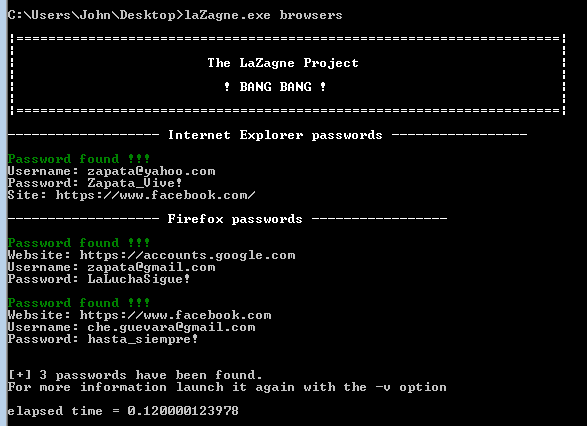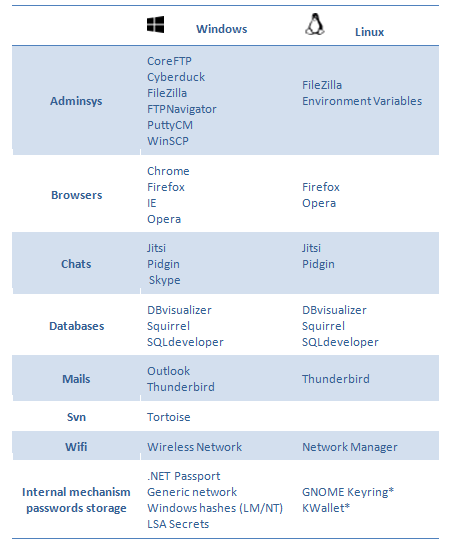The LaZagne Project !!!
Description
The LaZagne project is an open source application used to retrieve lots of passwords stored on a local computer. Each software stores its passwords using different techniques (plaintext, APIs, custom algorithms, databases, etc.). This tool has been developed for the purpose of finding these passwords for the most commonly-used software. At this moment, it supports 22 Programs on Microsoft Windows and 12 on a Linux/Unix-Like OS.
Usage
-
Launch all modules
- cmd: laZagne.exe all
-
Launch only a specific module
- cmd: laZagne.exe <module_name>
- example: laZagne.exe browsers
- help: laZagne.exe -h
-
Launch only a specific software script
- cmd: laZagne.exe <module_name>
- example: laZagne.exe browsers -f
- help: laZagne.exe browsers -h
-
Write all passwords found into a file (-w options)
- cmd: laZagne.exe all -w
Note: For wifi passwords \ Windows Secrets, launch it with administrator privileges (UAC Authentication / sudo)
Supported software
(*) used by many tools to store passwords: Chrome, Owncloud, Evolution, KMail, etc.
IE Browser history
Internet Explorer passwords (from IE7 and before Windows 8) can only be decrypted using the URL of the website. This one is used as an argument of the Win32CryptUnprotectData api. Thus, using the browsing history of ie will permit to decrypt many passwords. To do that, I used a dll written in C code (the code is in the "browser_history_dll" directory) and it is directly embedded to the Python code as a Base64 string (c.f. ie.py). Once launched, the dll is written on the disk, a wrapper is used to call dll functions and then the dll file is removed from the disk.
Windows hashes
To dump windows hashes and LSA Secrets, the impacket library has been used: https://github.com/CoreSecurity/impacket
Build your own password recovery script
It's possible to write your own script for the software of your choice. Building your own module has become extremely easy.
To do that, some code standards are to be met:
-
Create a class using the name of the software containing 2 importants functions:
- init: used to define all arguments used to launch the class.
- run: will be the main function
-
Add on the config.manageModules.py file your class name and your import
-
The output containing all passwords has to be send to the "print_output" function - ex: print_output(software_name, password_list)
- password_list has to be an array of dictionnaries.
-
Optional: you could use the function "print_debug" to print your output
- ex: print_debug("ERROR", "Failed to load ...")
-
Use an existing script to understand what I have said :)
If you want to improve this tool, you can send me your script and it will be added to this project (authors will be, of course, credited on each script ;)).
Requirements
To compile the source code, some external libraries are required.
-
For Windows
-
colorama (for the Console colors)
-
Python for Windows Extensions
-
pycrypto
- pip install pycrypto
-
Impacket (for Windows hashes + LSA Secrets)
-
-
For Linux
-
For Ubuntu 14.04
- python-kde4 (Kwallet)
-
Other distributions
- Python 2.7
- argparse
- Crypto
- dbus (Pidgin)
- python-kde4 (Kwallet)
-
| Alessandro ZANNI |
|---|
| alessandro.zanni@bt.com |
| zanni.alessandro@gmail.com |

